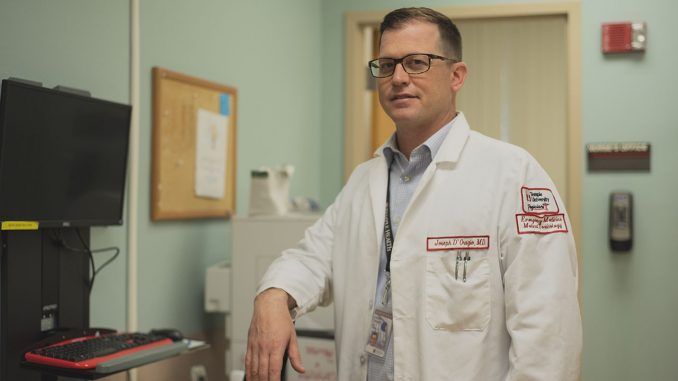
Temple University Hospital will complete a full expansion and add services to its Temple Recovery Using Scientific Treatments Clinic by October after receiving a $1 million grant from Pennsylvania Gov. Tom Wolf.
The grant money, which was awarded to Temple in July, will provide enhanced treatment options for people with substance use disorder. The expansion will include, easier access to treatment, case management support, group therapy, on-site counseling and an expansion to its Suboxone medication-assisted treatment program.
The current Suboxone program treats about 100 patients. With the expansion, the clinic will be able to treat 300 patients, a spokesperson for TUH wrote in an email to The Temple News.
TUH received one of three $1 million dollar grants dedicated to funding medication-assisted treatment centers. This grant is part of a larger initiative by Wolf called the Pennsylvania Coordinated Medication-Assisted Treatment Program, which aims to provide accessible treatment options for people battling substance use disorder, specifically opioid use disorder.
In 2017, the Kensington and Port Richmond neighborhoods reported 209 overdose deaths, the Inquirer reported in June. The Frankford, Juniata Park and Crescentville neighborhoods recorded a 155.6 percent increase in fatal overdoses from 2016.
The hospital will act as the center for treatment, but there will be partners in the city where patients can be transferred to depending on their needs. The hospital works closely with the Episcopal Campus on Lehigh Avenue near Front Street, and patients from that emergency department, its Crisis Response center or the inpatient units can receive treatment at the clinic.
Dr. Joseph D’Orazio, an assistant professor in the department of emergency medicine and specializes in addiction medicine, will be a co-director of the updated treatment center with Dr. David O’Gurek, an associate professor of family and community medicine who has a clinical interest in addiction medicine.
D’Orazio said the center needs to be updated to include longer-term treatment outside of medication. like Suboxone, a pain and addiction treatment for opioid-dependent patients.
When a patient is treated at the emergency center for a medical complication from drug use, they are immediately administered Suboxone. They are then transferred to the clinic where they will continue to receive Suboxone treatment and drug counseling, D’Orazio said.
“While Suboxone works really well at managing opioid dependency, that medication does nothing to treat substance use disorder, necessarily,” he added. “Drug counseling works well at managing your reaction to stress in your life and how you can change your behaviors.”
O’Gurek said the treatment center will also focus on preventative care and harm-reduction methods.
“Trauma-informed care is basically what we have to do for everyone, but it’s particularly important for patients struggling with addiction and their families,” O’Gurek said.
TUH currently offers treatment for substance use disorder within the department of family and community medicine, a clinical space in Jones Hall. The hospital implemented a similar treatment program in January 2017 through the Temple/Wedge Center of Excellence, which offers pain management drug counseling, prenatal care and mental health services for pregnant women struggling with substance use disorder.
State Secretary of Health Rachel Levine said the state recognizes three pillars of addiction treatment: prevention, rescue and treatment.
“Under Gov. Wolf’s disaster declaration for the opioid crisis, the state is taking an all-hands-on-deck approach to address this crisis,” Levine said.
O’Gurek said that social aspects play a major role in the treatment process.
“Caring for patients struggling with substance use disorder is much more about caring for all the social things that sort of affect their recovery, much more than the actual medical components,” O’Gurek said. “It’s often those social components, the challenges with transportation, housing, food security, education and work that often are barriers and limitations for individuals.”
Levine said funding treatment methods should be a focus of the government moving forward.
“It is essential that people understand that substance use disorder is a disease, not a moral failing,” Levine said. “We must get continue to work to get these people into treatment, because treatment works, and recovery is possible. We must continue to have hope for our state and our communities as we work to address this crisis.”


Be the first to comment